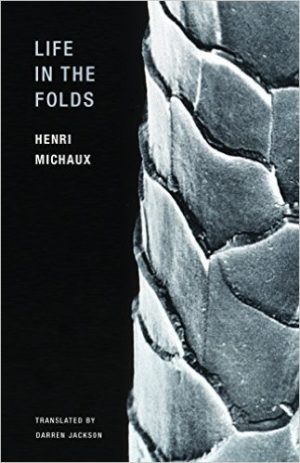In Their Own Words
Darren Jackson on Translating Michaux’s “The Sack Session”
The Sack Season
The Sack Season
I spit on my life. I want nothing to do with it.
Who does no better than his life?
It began when I was a child. There was a big cumbersome adult.
How to get revenge on him? I put him in a sack. There I could beat him at my leisure. He cried out but I didn't listen. He wasn't interesting.
I sensibly kept this childhood habit. I don't trust the possibilities for intervention one learns as an adult, and besides, they don't work very well.
You don't offer a chair to someone in bed.
This habit, I say, I've kept it and until today kept it a secret. It was safer.
Its disadvantage—for there is one—is that because of it, I have too much tolerance for impossible people.
I know that I'm waiting for them with the sack. It's something that teaches extraordinary patience.
I allow ridiculous situations to drag on and I dawdle about my life-blockers.
The joy I would feel in throwing them out the door in reality is withheld at the moment of action by the incomparably greater delights of soon putting them into the sack. Into the sack where I beat them with impunity and with an enthusiasm to surpass ten robust men methodically taking turns.
Without this little art of mine, how would I have spent my depressing life, often poor, always under the elbows of others?
How would I have been able to carry on for decades through so many tribulations, under so many masters, near or far, through two wars, two long occupations by an armed people who believe in knocking down bowling pins, against other innumerable enemies?
But this liberating habit saved me. Barely, it's true, and I resisted the despair that seemed bound to leave me nothing. The nonentities, the bores, a brute I could have freed myself from a hundred times over: I set them aside for the sack session.
—Translated by Darren Jackson
From Life in the Folds by Henri Michaux (Wakefield Press, 2016). All rights reserved. Reprinted with the permission of the translator.
On Translating Michaux's "The Sack Session"
Even though "The Sack Session" is one of a handful of previously translated poems from Life in the Folds, it still presented one of the greatest challenges for me, and remains one of my personal favorites. The violence, absurdism, shifting linguistic registers, and emphasis on gesture as image combine with Michaux's particularly dark, dry humor to present a reality dependent on the imagination. It may well be Michaux at his most Michaux. Part of the challenge I faced in translating this poem (and Life in the Folds in general) revolved around the tonal shifts, slight changes in register and syntax that create the irony on which Michaux's humor depends.
The poem begins conversationally enough, describing how the persona's problems with life began as a child. The sentences are fairly choppy as we adjust to a reality where the persona, even as a child, had the power to incapacitate and beat whoever bothered him. The shift in perspective, from child to adult, is signaled through an increase in abstraction and convolution of syntax: "I don't trust the possibilities for intervention one learns as an adult, and besides, they don't work very well." The register also shifts as the diction elevates with "possibilities for intervention." Yet, in the original, "Les possibilités d'intervention qu'on acquiert en devenant adulte, outre qu'elles ne vont pas loin, je m'en méfiais," the division of the syntax into three distinct phrases mimics the choppiness of the beginning, but that syntactic echo depends on an idiomatic French structure that does not have a good parallel in English. That middle phrase, "and besides," was the closest I could come to the original without sounding unintentionally awkward.
The persona then makes an intentionally awkward gesture to explain the superiority of his "sack session" over those adult skills of "intervention": "You don't offer a chair to someone in bed." The absurdity of the comparison suggests the persona's disdain for well-adjusted adults and carries with it a suggestion of weakness, which foreshadows the punchline to come as the persona shifts focus on the problem with his power.
Instead of extricating himself from unpleasant people, he finds that his power grants him "patience," which causes him to accept bad situations. However, he asks how else he might have survived a "depressing life, often poor, always under the elbows of others." Here, Michaux's absurd imagery undermines the pathos within which it is couched, so that it ironically mocks the speaker. Early in my process, I had translated those "elbows" as headlocks, thinking to render the image more concretely for an American audience, but that small change eliminates the irony, for "elbows" is an intentionally strange image for this persona's oppression.
The next paragraph develops this strategy as it shifts into a recognizably historical reality: "How would I have been able to carry on for decades through so many tribulations, so many masters, near or far, through two wars, two long occupations by an armed people who believe in knocking down bowling pins." Suddenly we move from an imaginary that seems to bear little relation to the world we know to a 20th century Europe still traumatized by the great wars; in the same breath, the persona heightens the absurdity by characterizing the violence of the occupiers through a game. The absurdity of the image reduces the terror and suffering so that it is manageable, and that is the ultimate irony. The persona's mental powers, his sack session, grant him the ability to cope with anything as if it were a game, so he is stuck enduring the problems of life as he cannot both resolve them and enjoy his one exercise of power.



